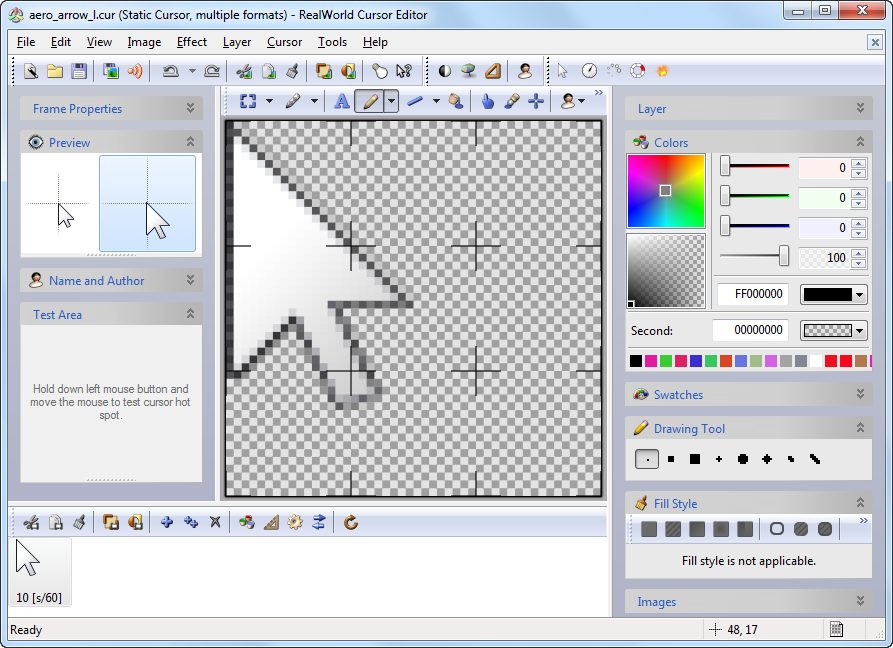Step 5: Now, you can change the cursor size by dragging the cursor size bar. Step 6: Also, check the shake mouse pointer to locate option. This will make the cursor temporarily larger when you shake the mouse. This method of changing mouse cursor size is useful for Mac OS 10.8 and later.
• • • • • • • These days, all popular operating systems are pretty intuitive when it comes to basic usage. However, if your vision is not what it used to be, you can benefit from tweaking accessibility features. For example, it’s possible to enlarge the mouse cursor on Windows, Linux, Mac, and Chrome OS – this is one of the most common needs, and almost any operating system lets you do it. A larger mouse cursor means you will be able to track it more easily regardless of what’s displayed on the screen. You also won’t be forcing your eyes so making the cursor bigger might even save you a headache. How to enlarge the mouse cursor on Windows, Linux, Mac, and Chrome OS As I already said, you can enlarge the mouse cursor on Windows, Linux, Mac, and Chrome OS.
For each operating system, the method is different but still easy – since this is an accessibility feature, it’s designed so anyone can customize it. How to enlarge the mouse cursor on Windows 10 In Windows 10, open the Settings app and navigate to Devices, then select “Mouse” on the left sidebar. In the Mouse Settings window click on the “Additional mouse options” link. This will open the Mouse Properties window. There, go to the Pointers tab and in the Scheme section select Windows Default (large) or Windows Default (extra large). These options will simply enlarge the mouse cursor but keep its original appearance. If you’re not sure which to choose, select one hit the Apply button to see how big it is and do the same with the other.

Then, choose the one that works best for you and hit the OK button to apply the change and close the Mouse Properties window. How to enlarge the mouse cursor on Linux In Ubuntu, enter the line below into a Terminal window: dconf write /org/gnome/desktop/interface/cursor-size 48 You can replace 48 with a different number to experiment with the size until you find the perfect one. Linux comes in various flavors so the solution above might not work for you. Read on Stack Exchange for alternative methods. How to enlarge the mouse cursor on Mac OS On your Mac, click the Apple Menu and select System Preferences.
To continue, select the Accessibility menu and go to the Display tab. Then you can dynamically resize the cursor by sliding the Cursor Size slider to a size that suits your need. Once you’re happy with the size of the mouse cursor you simply need to close the window. How to enlarge the mouse cursor on Chrome OS It’s quite easy to adjust the mouse cursor size on a Chromebook. Navigate to Settings, scroll down until you see the “Show advanced settings” option and click on it. Go to Accessibility and check the option called “Show large mouse cursor”. This will make it significantly bigger.
Connect with us on,,.
• • • • • • • These days, all popular operating systems are pretty intuitive when it comes to basic usage. However, if your vision is not what it used to be, you can benefit from tweaking accessibility features. For example, it’s possible to enlarge the mouse cursor on Windows, Linux, Mac, and Chrome OS – this is one of the most common needs, and almost any operating system lets you do it.
A larger mouse cursor means you will be able to track it more easily regardless of what’s displayed on the screen. You also won’t be forcing your eyes so making the cursor bigger might even save you a headache.
How to enlarge the mouse cursor on Windows, Linux, Mac, and Chrome OS As I already said, you can enlarge the mouse cursor on Windows, Linux, Mac, and Chrome OS. For each operating system, the method is different but still easy – since this is an accessibility feature, it’s designed so anyone can customize it. How to enlarge the mouse cursor on Windows 10 In Windows 10, open the Settings app and navigate to Devices, then select “Mouse” on the left sidebar. In the Mouse Settings window click on the “Additional mouse options” link.
How to Recover an Unsaved Word Document on a Mac. Microsoft Word on a Mac computer includes an AutoRecovery option. This is turned on by default when you install Word on OS X so that the app will automatically save a copy of an open document every 10 minutes. If Word freezes while you're working on a file, or if the computer crashes. ► Recover from the AutoRecovery. Close Word for Mac. On the Go menu, click Home. Open the Documents folder, and then open the Microsoft User Data folder. Locate all the files that start with the words 'AutoRecovery save of'. Select the one you want to recover, rename the file. 
This will open the Mouse Properties window. There, go to the Pointers tab and in the Scheme section select Windows Default (large) or Windows Default (extra large). These options will simply enlarge the mouse cursor but keep its original appearance. If you’re not sure which to choose, select one hit the Apply button to see how big it is and do the same with the other. Then, choose the one that works best for you and hit the OK button to apply the change and close the Mouse Properties window. How to enlarge the mouse cursor on Linux In Ubuntu, enter the line below into a Terminal window: dconf write /org/gnome/desktop/interface/cursor-size 48 You can replace 48 with a different number to experiment with the size until you find the perfect one.
